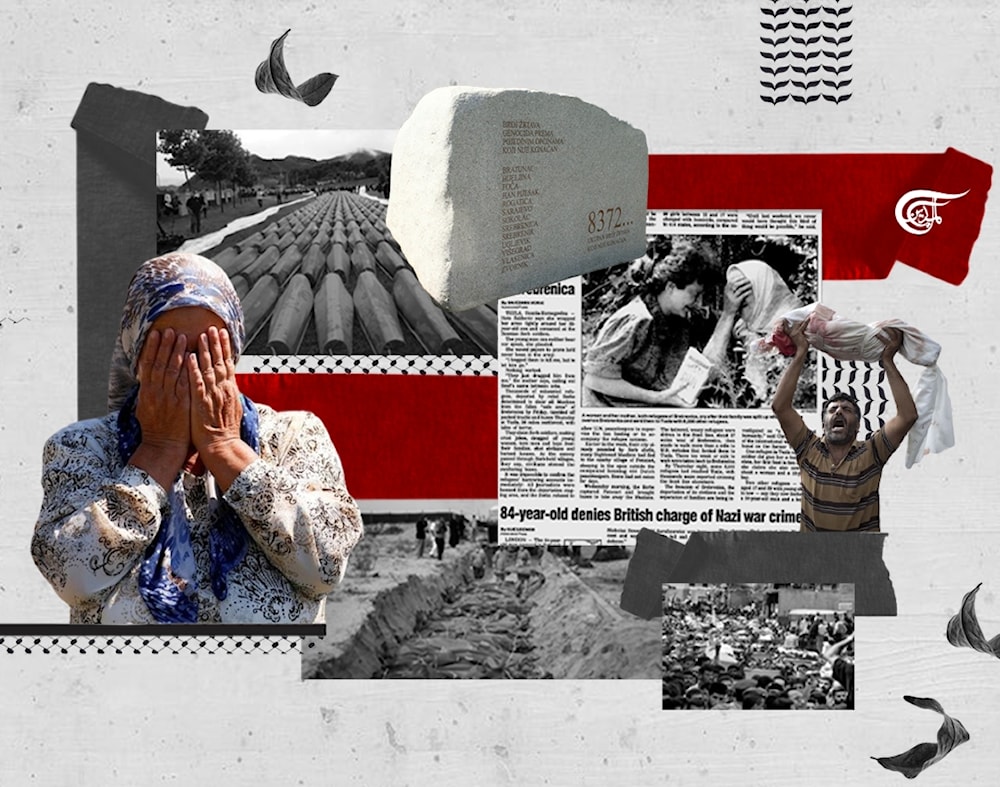Genocide as a political weapon
The author responds to claims made by Detektor Media against an article of his on Al Mayadeen, recounting the circumstances accompanying the Srebrenica massacre.
-

Between the ruling on the Gaza war based on South Africa’s case against “Israel” and the ruling on the Srebrenica massacre
On January 26, the International Court of Justice (ICJ) issued a landmark ruling in the case brought by South Africa against "Israel" under the Genocide Convention. While it neither indicted nor convicted the Zionist entity of genocide or formally demanded a ceasefire, "Tel Aviv" has been warned by the Court in no uncertain terms to end its indiscriminate slaughter of Palestinian civilians. A failure to do so absolutely will lead to a genocide indictment.
Another of the ruling’s most significant findings was that "Israel’s" actions in Gaza could not be justified as legitimate "self-defense" in any way, therefore making a mockery of the longstanding, ubiquitous Western narrative that the Zionist entity “has a right to defend itself.” Elsewhere, it was ruled that the statements of senior Israeli government officials were indicative of genocidal intent.
Several representatives of Western governments that egregiously dismissed the “premise” of South Africa’s ICJ case or outright supported the Zionist entity in its losing battle have met and appeared in public with the same Israeli officials found to have advocated genocide in Gaza, since the 21st Century Holocaust began. One wonders whether they will be doing so ever again, given that they could be accused by the Court of complicity in grave crimes against humanity.
A January 14th Al Mayadeen investigation highlighted Western double standards on genocide. It exposed how NATO member states, via the International Criminal Tribunal for the Former Yugoslavia (ICTY), invested significant time, energy, and money to convict Serb officials of that crime over the July 1995 Srebrenica massacre in Bosnia, despite significant evidentiary shortcomings. It asked the obvious question of why the same governments oppose convicting their ally "Israel", given irrefutable proof of Zionist genocide.
Eleven days later, Sarajevo-based “fact-checker” Detektor Media published a deeply libelous hatchet job on the journalist and Al Mayadeen over the investigation, without approaching for comment. It leveled a welter of bizarre, provably false, and highly defamatory allegations, including; the investigation argued that the ICJ “must not indict Israel;" I am “on Russia’s payroll”, and the work was “commissioned” by Moscow; I denied the Srebrenica genocide, a criminal offense in Bosnia; I advocated further violence against Bosniaks.
In reality, not only did the investigation not deny the Srebrenica genocide, but it also explicitly called for "Israel" to be convicted of genocide and for other events in the Yugoslav wars to be classified as genocide, on the same grounds as Srebrenica. That many horrendous crimes committed in the enclave remain today unprosecuted and unpunished was also underlined. Detektor now faces the prospect of legal action, if its repulsive attack on myself and Al Mayadeen is not promptly retracted.
Detektor is part of the Balkan Investigative Reporting Network. Its funders are a veritable who’s who of Western foundations, governments, and embassies, many of which backed "Israel" at the ICJ. This raises the obvious question of whether the outlet’s vile slander was “commissioned” by these donors, due to their hypocrisy being so comprehensively exposed. In a perverse irony too, Detektor’s duplicitous broadside amply reinforces how what happened in Srebrenica has been politicized and weaponized ever since by bad faith actors.
‘Narrow, Nationalist Agenda’
For decades, there has been a lively debate among historians about the Holocaust, known as functionalist versus intentionalist. While academics do not doubt or question that the Holocaust happened, how and why it came to be is for some a fascinating question. The dispute boils down to whether the wholesale slaughter of “Untermenschen” was Adolf Hitler’s plan all along, or if it evolved on the Eastern Front, with or without his personal input, approval, and knowledge.
There is no comparable debate in Srebrenica scholarship. One might reasonably argue this simply cannot be permitted. For one, it would highlight the ICTY’s failure to unearth any evidence a specific order was given by any named official to massacre the enclave’s entire male, fighting age population, and other major gaps in our knowledge of what precisely transpired there, how, and why. But more gravely, the event would be contextualized, which Bosniak nationalists are keen to avoid at all costs.
The context was a brutal ethnic conflict pitting Croats, Muslims, and Serbs, previously friends, neighbors, and relatives, against one another. Thrust into a hellish, ever-escalating cycle of oft-medieval violence, atrocities, and war crimes were routinely committed by all sides. Srebrenica was designated a UN safe zone and was supposed to be demilitarized. Yet, all local Muslim males of military age could be conscripted. And Bosniak forces there routinely staged savage attacks on Serb forces and territory, including undefended villages, where they tortured and murdered civilians.
Following the war, under the terms of the November 1995 US-brokered Dayton Accords, Bosnia was divided into two segments - Croat and Muslim-majority Bosnia and Herzegovina, and Serb-majority Republika Srpska (RS). The Bosniak nationalist leadership was extremely unhappy with this, having rejected far more favorable Yugoslav, EU, and UN-proposed peace settlements before and during the war. They had naively believed their friends in Washington would assist them in their goal of seizing the entire country.
US diplomatic cables released by WikiLeaks document in extraordinary detail how, following the ICJ ruling in February 2007 - based on the ICTY’s findings - that genocide was committed in Srebrenica, “Bosniak political leaders exploited the verdict in order to advance their own narrow, nationalist political agenda.” At the forefront of this push was Haris Silajdzic, a member of the Bosniak delegation to Dayton as Bosnia’s Prime Minister 1993/6 and Bosniak President of Bosnia and Herzegovina 2006/10.
A March 2007 cable documents how in a private meeting with the US ambassador to Sarajevo, “when asked whether he intended to abolish RS or only remove Srebrenica from it,” Silajdzic “declared that he wants to abolish all cantons and entities” within Bosnia and void the Dayton Accords in their entirety. He further asserted, “Dayton was formed by necessity with pressure from…the international community,” the Bosniaks “had to sign…with a gun at our heads,” and “RS cannot remain as is.”
‘Orchestrated by others’
As per the cables, at the core of Silajdzic’s crusade was his legally dubious contention that RS was “an unlawful creation of genocide.” In multiple behind-closed-doors summits, he laid out assorted arguments for why the ICJ’s verdict “provided a new legal basis from which to retroactively question the terms of Dayton,” signed “under duress” during an armed conflict. He claimed to have only accepted the existence of RS as there had been no “official determination” of genocide in 1995.
Believing the ICJ had “changed the facts on the ground,” Silajdzic pledged to “exhaust every legal avenue to revise the results of genocide.” Repeatedly, US officials warned him in response that his desired “elimination” of Republika Srpska and the scrapping of Bosnia’s constitution and political structure “would be a unilateral abrogation of the terms of the [Dayton] Accords by Bosniak signatories and that such a step would be unacceptable.”
Undeterred, Silajdzic’s “elimination” efforts continued apace. US officials quickly grew exasperated with his campaigning, “increasingly confrontational posture”, and “willingness to pursue legal actions against the UN and other parties.” One cable bitterly questions whether he genuinely believed “his legal arguments have merit or he is simply seeking to force the international community to revisit Dayton."
“We can only conclude that Silajdzic’s ‘legal’ strategy is aimed at further inflaming Bosniak Muslim opinion here, thereby focusing US and international attention on their grievances. It is unfortunate that few observers in Bosnia itself are able to see through the sophistry of his arguments.”
It wasn’t only “legal actions” that Silajdzic and other Bosniak nationalists employed to pressure the international community into backing their quest to dismantle RS and con their people into believing this was a plausible and legitimate aim. They also staged numerous publicity stunts for the Western media’s delectation. In April 2007, then US Ambassador to Sarajevo Douglas L. McElhaney visited Srebrenica, making a stop at the Potocari Cemetery and Memorial Centre.
As a contemporary cable notes, “Mothers of Srebrenica victims arrived unexpectedly to protest his visit and the international community’s acceptance of the ICJ verdict.” At one point, they “blocked the entrance to the memorial, holding signs stating ‘McElhaney does not support victims of genocide - you are not welcome here!.'” An accompanying embassy “comment” states, “Bosniak politicians frequently manipulate and exploit the suffering of the mothers of Srebrenica victims, who lack a sophisticated understanding of Bosnia’s criminal justice system let alone international jurisprudence."
“Though their pain and suffering is real and justified, this ‘spontaneous’ protest was likely orchestrated by others. The mothers do not speak English, and we overheard several asking for translations of their English language signs. In addition, during the protest, a local embassy staff member overheard one of the mothers receiving instructions by phone.”
Three months later, a cable recorded how in the intervening time, “Bosniak political leaders created a tent settlement of ‘Srebrenica refugees’ in Sarajevo, staged protests outside the Presidency, and even faked an attack on a Bosniak returnee in the village of Ljeskovik to gain public support for Srebrenica’s secession” from RS. Detektor Media’s attack on this journalist and Al Mayadeen should perhaps thus be viewed as the latest Bosniak nationalist publicity stunt intended to secure Republika Srpska’s “elimination”.
After all, a key source for the hatchet job’s most libelous charges was none other than Emir Suljagic, director of the Western-funded Potocari Cemetery and Memorial Centre. Currently, RS authorities are engaged in a bitter legal fight with Bosnia’s national government, which is seeking to claim all Republika Sprska’s territory as its state property. If successful, Bosniak nationalists would be one step closer to voiding Dayton. As such, anyone asking awkward questions must be silenced.

 Kit Klarenberg
Kit Klarenberg
 10 Min Read
10 Min Read











